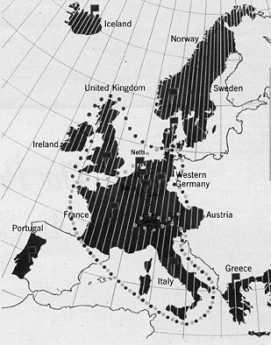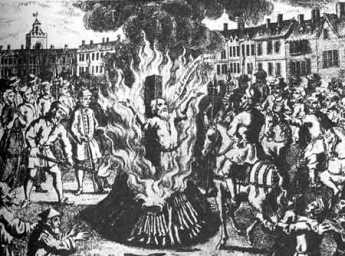Related Topics
Benjamin Franklin
A collection of Benjamin Franklin tidbits that relate Philadelphia's revolutionary prelate to his moving around the city, the colonies, and the world.

Union, Now and Forever
BIG nations gobble up small ones, so small ones band together. As George Washington observed, when you are strong the others leave you alone. But other forces sometimes make smallness seem more attractive, especially if the nation is already uniform in religion, language, and culture. Nations search for an ideal size for both War and Peace and discover they praise two incompatible sizes. Both the American Revolution of 1776 and today's struggles of the European Union fit a common formula: banding together for military security, then pulling back from declining Liberty. The American experience of a Civil War after eighty years under the Constitution suggests the margin for error is narrow. And enduring; even in the Twenty-first century, it is striking that both little Scotland and that little bit of little Belgium that is Flemish seem willing to sacrifice major economic benefits for what seems to outsiders a minor step for Liberty. But the whole point of the Constitutional Convention then seems to emerge: Nine years previously, thirteen separate sovereignties had been more or less hustled into a military alliance by the appearance of a hostile British fleet. That war was now over, the thirteen had grown accustomed to living together, but the Articles of Confederation had not foreseen a large nation clearly enough in 1776. The Articles did not even provide for an executive branch. In the chaotic conditions of 1787, a calmer choice could be made between breaking apart and unifying, for a different set of reasons based on Peace and Prosperity rather than war: Either surrender some aspects of state power to a real union or let each contentious state confront its future, unsupported. In many ways, it was the vision of Liberty which changed between times of peace and times of war. In 1860 the stakes were higher than in 1787 but the issues were mixed. Industrializing states in the northern part viewed the Union as an economic opportunity. Purely agricultural southern American states were not so sure; in the end, preferring the older set of rules, they took their leap. To the amazement of Southern leaders, the North was ready to die to preserve that Union, and so the demands of warfare reasserted themselves.

|
| Europe |
Geography doubtless imposes variable limits for both war and peaceful prosperity, anywhere. Some nations have therefore banded together for military reasons then split apart in local quarrels, more or less regularly. Thirteen American colonies had been afraid to confront Britannia alone, but somewhat overconfidently took on that challenge as a confederation. At the other extreme, little Rhode Island even refused to send delegates to the Constitutional Convention, fearing big neighbors more than remote British rule. Fortunately, similar possessiveness about local perks was unable to collect enough political power to dominate other states. After a year by the time of the state ratifying conventions, however, it was a close call. Peace and prosperity: getting bigger discourages predators, but getting smaller offers sole possession of what you have. Since the United States grew in jumps through most of its history, it probably learned intangible things from alternating episodes of being too big and then too small. Frederick Jackson Turner's thesis of the advancing frontier as a shaper of culture is not greatly different in the essence of its argument.
When ideas of Union first gained traction, both the thirteen American colonies in the Eighteenth century and the twenty-five nations of the Eurozone in the Twenty-First, were dominated by the memory of war. The American objective was the simple one of military parity with a common enemy. The nations of the European Union had a longer view; a seemingly endless cycle of bloody wars sustained their conviction that other wars would inevitably follow unless they did something innovative. National unification on the American model sounded ideal but difficult. Perhaps the habits of cooperation and trade would lead to it. The unexpected decline of the Soviet empire further reduced the fear of war. Pride may also have led to over-reaching; twenty-five is comfortably larger than thirteen, which up to that time was the largest nation merger to survive. But twenty-five is smaller and thus more manageable than the present American fifty. To begin the process with monetary union might produce quick benefits from a source too mysterious to produce much public resistance. Nobody could think of a war started by a monetary dispute.

|
| Justice Blackmun |
, Of course, the Europeans expected difficulties from speaking many languages, but they probably still underestimate how far the legal profession has already gone in confining nuanced words to a single meaning; it is essential to their trade. When many languages split off from a common stem, many unaccepted interpretations re-emerge when they are later re-combined. Even without the nuance problem, translation into many languages is a serious expense, which is at least as burdensome as currency exchanges were among multiple sovereignties. By contrast two centuries earlier, the American revolutionaries shared a single language but soon found espionage was an unusually serious problem. Even their enemy spoke English, so sometimes improved clarity itself creates unexpected problems. Indeed, in American disputes about Original Intent, we repeatedly encounter the tenacity of people believing a document says what they want it to say. Vigorous legal advocates think they are paid to marshall every argument weak or strong. Staying within the English language, the evolution of U.S. Supreme Court interpretations often turns on subtle differences in the meaning of simple words. Penumbras and emanations from the word "Privacy" in Roe v. Wade soon force our judges to decide whether abortion within a right of privacy is simply too far from a common understanding of English, in a double way. Both in the discovery of a right to privacy within a document which does not use the word, and then in the inclusion of abortion within that, Justice Blackmun clearly overestimated the capacity of excited citizens to be flexible. Much more surely, he would have overestimated public willingness to grasp his meaning in two-step translations of a foreign language. Since this famous decision is destined to stand or fall, depending on public tolerance for such wordplay, having almost every citizen confidently understanding English is at least one advantage. Parenthetically, we will need every advantage possible. The really serious box which Justice Blackmun put us in, was to invent a Constitutional mandate which thus can only be compromised in a Constitutional amendment. In almost every other conflict, the system of checks and balances permits either the Congress or the state legislatures to soften the conflict with conciliatory modification. The constitutional amendment is already difficult to achieve; inflaming the religious passions of the forty-odd bodies who must agree to amendment makes amendment nearly impossible.

|
| Auto-de-fe |
By contrast with important language confusions, "hatreds between nations" are often mentioned as an obstacle to unification but the claim seems largely bogus. Argot and slang are commonly invented to conceal the opinions of a minority group. Over thousands of years, this purpose of "jiving" a secret code among conspirators has been perfected exquisitely. It's hard to overcome, easy to teach children. But the memory of actual wars really dies out rather quickly, not least because atrocities are so hideous, mankind wants to forget them. I was seventy years old before someone told me I had ancestors burned at the stake. By whom? By someone who has also been dead for four hundred years, not likely to seem threatening to me. Over the fifty years since the Second World War, I have run into former German and Japanese soldiers; they now seem pretty benign. One American former prisoner of war was forced to stand at attention while his Japanese captor pulled out his gold teeth with pliers; he told this story with a faint smile. It is one of the benevolence of biology that we are born without memories, and a second is a biological impossibility of remembering the feeling of pain without first re-dramatizing the experience for future reference. Once actual onlookers stop grinding the grievance ax, it should be possible to get on with devising a European constitution, provided it contains a meaningful equivalent of our First Amendment.

|
| Helen of Troy |
It's an important point for a proposal unifying two dozen different priesthoods and a number of nations wholly defined by a single religion. A workable constitution for them must contain a strict separation of church and state, because ballads, epic poems, and traditions are synthetic, quite different from actual experiences. Helen of Troy may or may not have had a face that launched a thousand ships, but Homer's Iliad certainly glorified more hatred than she did; who can say whether the poem portrays the truth? That's the war side of things; the Odyssey is powerful in evoking the special virtues leading to prosperous nationhood. Because you can't argue or reason with epic myth, it is the many exaggerated glorifications and exaggerated condemnations by them which supply endurance to patriotic myths, easily reducing macroeconomists of the European Central Bank to tears of frustration. Because the best of these epics stand alone as powerful literature, their propaganda strength is all the more difficult to deconstruct with mere logic. Quoting Arnold Toynbee, it is not weaknesses, but overextension of their finest qualities, which usually brings nations down.

|
| Euro Zone |
While true grievances seldom pose obstacles of their own, they do often misdirect political leadership from what is best for their countries. European Unification had a primary goal of eliminating future wars, but its leaders decided the peace goal was achievable only by indirection and began first with monetary tools for prosperity. That takes a long time; America was still fumbling monetarily until the end of the Civil War. So while starting with small victories seems a plausible route to big victories, in fact, it drains much of the idealism out of revolutions by avoiding the cataclysmic issues which justify great sacrifices. Even worse, it here made the financial disaster of the Euro symbolic of tawdry hazards on the road to Prosperity, raising issues of corruption and self-advancement, rather than idealistic sacrifice. At least when you struggle for national security, every day you survive is another victory. There is, of course, no room in past struggles for Americans to gloat over their superior approach to permanent Union. But a defeat is a defeat, and the Euro mess could become a big defeat.

|
| Congressman Ron Paul |
From a commentator's perspective, currency matters are difficult to understand and explain. For contrast, the Battle of Normandy is thrilling and awe-inspiring; every death is the death of a hero. But rises in productivity and the risk implications of volatility, seem hopelessly confusing to an economics beginner. Worse still, there exists real uncertainty among experts. We now have a currency which has no backing in precious metals and is really just a book entry. That's useful for transactions, less certainly useful for a storehouse of value. Mr. Ron Paul ran for President of the United States challenging the whole Federal Reserve concept, and a possibility must be admitted that his speeches have a grain of truth. We trust our bankers to devise a workable system of exchange without gold and silver, and readily admit that Mr. Bernanke knows more about it than we do. But. But the world economy nearly collapsed utterly a few years ago, and you know, Dr. Ron Paul might just have a valid point or two. Europe has not yet emerged into a fit environment for enjoying a monetary Crusade to a World Without War. For a striking contrast, just go to any Civil War movie. And watch those teenaged soldier boys charge up the hill, ready to die for the Union.
REFERENCES
| A Study of History Arnold J. Toynbee ISBN-13: 978-0195050806 | Amazon |
Originally published: Tuesday, March 06, 2012; most-recently modified: Friday, September 20, 2019